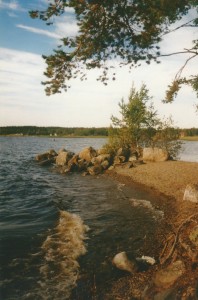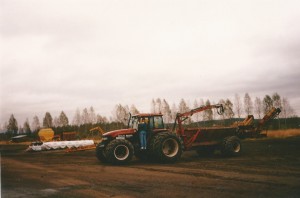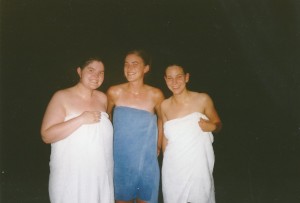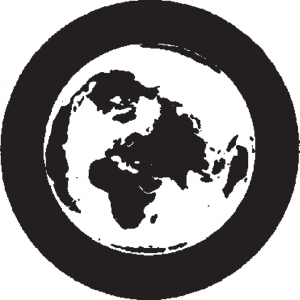Sara Haapanen
I’m going to give my age away here being the wrong side of 35, but along with the grey hair, wrinkles and lack of sleep kids bring I’ve learned a few things along the way. I graduated from a great university back in 2000 and loved it. Much like studying here, the department staff were very informative, helpful and very approachable. I was happy, learning and having fun.
 For the second year, we were offered an exchange to Joensuu, Finland. This was the one and only chance to do an exchange as they weren’t very popular back then. I had never flown before, never been outside of the UK and just decided I would do it. I was the only one out of the whole year to join up – I can sum my feelings up in one word – NERVOUS! I knew so little about Finland mostly that fish was popular and it was cold in the winter.
For the second year, we were offered an exchange to Joensuu, Finland. This was the one and only chance to do an exchange as they weren’t very popular back then. I had never flown before, never been outside of the UK and just decided I would do it. I was the only one out of the whole year to join up – I can sum my feelings up in one word – NERVOUS! I knew so little about Finland mostly that fish was popular and it was cold in the winter.
I think everyone was a bit shocked when I announced I was off for half a year, one friend’s stunned comeback was “but what about reindeer walking down the street?” But I got lots of support from friends and family, useful presents like hats and scarfs, lots of ‘good luck’ cards to decorate my new room with. Preparation wise, I worked over the summer to save some money, applied for all the loans and grants that were possible and made my budget. Bought a return ticket so that I knew even if I found it a struggle it would be time limited. Properly checked the weather and bought and packed suitable wear and then it was time to be off.
 And it turned out to be the best thing I ever did! The biggest shock was the white empty studio room I had, quickly corrected with blu-tac, a pile of photos and all my cards. But I made lots of friends, had lots of fun and some very new experiences.
And it turned out to be the best thing I ever did! The biggest shock was the white empty studio room I had, quickly corrected with blu-tac, a pile of photos and all my cards. But I made lots of friends, had lots of fun and some very new experiences.
My degree is in geography but because of arts/sciences definition I needed to study in the forestry department. It was a completely new topic to me, do you know the joke about taking a road trip in Finland? It goes like this “tree, tree, ABC, tree, tree ABC, tree, tree, ABC”. That was pretty much my tree knowledge summed up. Thankfully I can say I managed to improve on that.
I learned a lot about trees and Finnish nature and it was fascinating. I learned about Finnish forestry processes and the livelihoods that were dependent on it. I learnt about wood biomass (the energy gained from wood), peat bogs, paper production and berries. The forests had gone from being somewhere peaceful and scenic to walk in to being a huge provider that so many people were dependent on.
I managed to learn about Finns outside of this course too. Through making Finnish friends and taking some trips. I learned about things they loved ice-hockey, sauna and Nordic walking to state the obvious things. But knowing the people and the important of the forest environment made me understand why nature is treasured so much in Finland. It means life. The provision of food, wood for heating, the resources generate income, the peace and tranquility to be in the middle of a scenic forest like no one else is around. Peace, relaxation and mindfulness.
Development geography was not something I had studied before I started at Helsinki (I did a combination of human and physical for my BSc Honours) but on reflection I can comment on it. Development geography is of course studying to look at the standard of living or quality of life. Comparing it to the UK I could see it was what we may call a “no brainer”. Finns had and still do in my opinion have a very high standard of living. The economy has it ups and downs but in general thrives and I felt was doing well when I visited. The population was well looked after by a welfare state, which meant no one should really have to go without those things I consider to be a basic human right. Work life was much more limited to those work hours and meant free time could actually be enjoyed with friends and family and I feel most importantly in the nature. Growing up I lived in a busy seaside resort and trips to the real countryside were cherished. Where I lived in Joensuu, I had a beautiful forest and lake five minutes’ walk from my apartment. To me it seemed Finland had it all, and it was not hard to see why it was such a beautiful country.
I’ve lived in Finland a while now (and yes I’m sorry my Finnish is terrible but I keep trying!). I’ve worked for more years than I care to count teaching daycare and having my own children in the middle. I wanted and needed a change and really felt that I wanted to study again. At university I had really developed a passion for human geography and wanted to follow that up. I applied to study geography here, never thought I would get in and still vividly remember getting the acceptance email and bursting into tears in the middle of serving lunch to my class. It was only when I went to talk to the study advisor that I found my area would be development geography. I had to go home and read up on it. And well, I was delighted. It was completely “me”. I couldn’t be happier to say I’m completely loving it. I think it’s fair to say we all like a little moan about the work load from time to time or some essay/topic we are struggling with, but I couldn’t be happier. I completely made the right choice.
When we study somewhere new and especially in a new country the whole process is learning. It’s adapting your lifestyle, manners and changing your comfort zones to fit in with other’s view’s and values. It’s changing yourself. I think it makes you value other people’s beliefs, cultures and living much more.
That exchange trip changed me as person for the better and I got some valuable experiences both personal and academically. On an exchange you will learn so much, see things in a new light and develop new ways of thinking. If you are thinking about taking an exchange somewhere, just do it.




